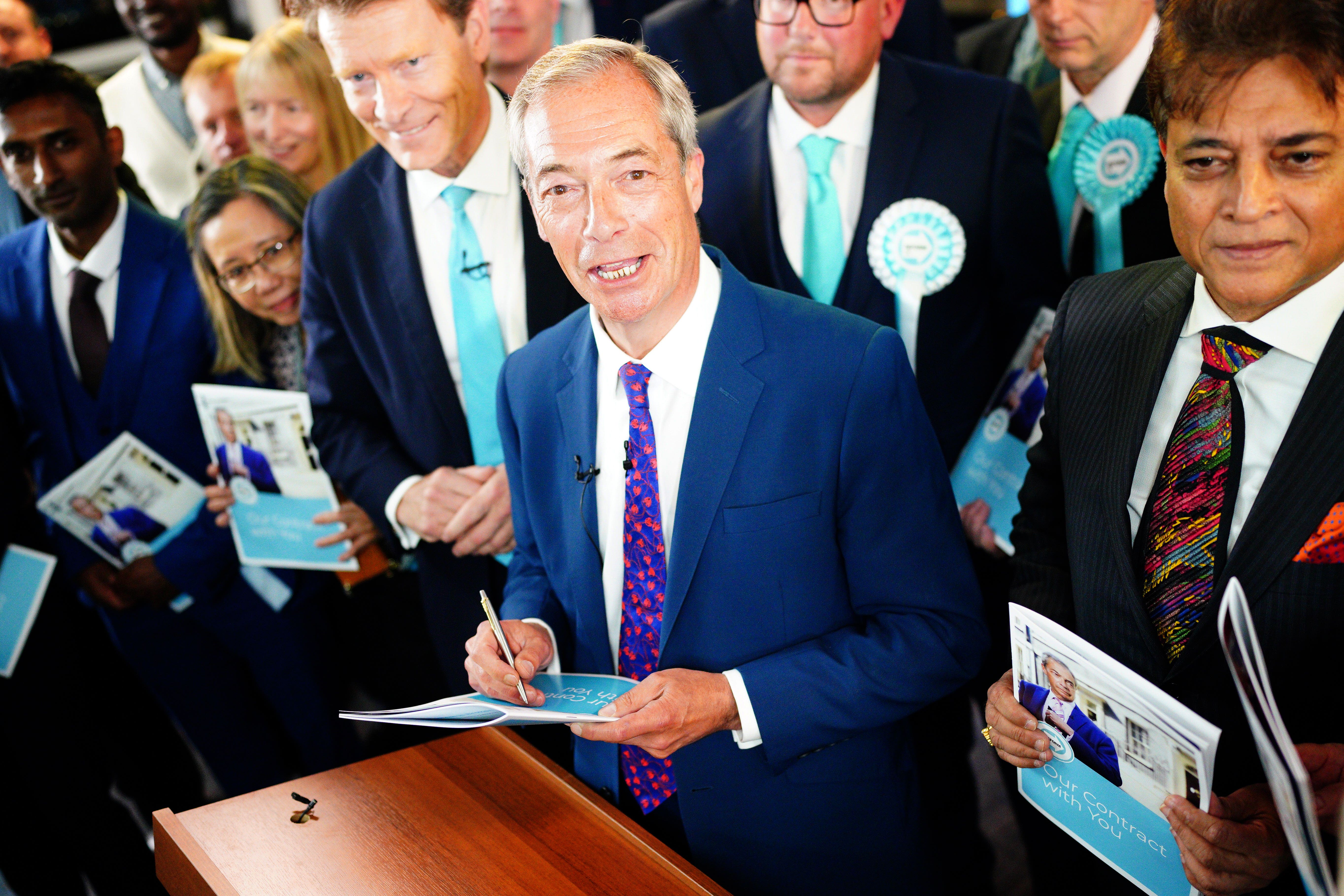Farage: July 4 is ‘first big push’ as he eyes greater things for Reform
Nigel Farage said Reform UK’s ‘real ambition is the 2029 general election’.

Your support helps us to tell the story
From reproductive rights to climate change to Big Tech, The Independent is on the ground when the story is developing. Whether it's investigating the financials of Elon Musk's pro-Trump PAC or producing our latest documentary, 'The A Word', which shines a light on the American women fighting for reproductive rights, we know how important it is to parse out the facts from the messaging.
At such a critical moment in US history, we need reporters on the ground. Your donation allows us to keep sending journalists to speak to both sides of the story.
The Independent is trusted by Americans across the entire political spectrum. And unlike many other quality news outlets, we choose not to lock Americans out of our reporting and analysis with paywalls. We believe quality journalism should be available to everyone, paid for by those who can afford it.
Your support makes all the difference.Nigel Farage said he wants Reform UK to establish a “bridgehead” in Parliament with a view to a full assault in five years’ time as he launched his party’s set of election promises.
The Reform leader suggested he could be in No 10 following the next general election, but the July 4 contest is too early for his party.
“The real ambition is the 2029 general election,” he said, “but this is our first big push.”
The Reform document is titled “Our Contract With You” because Mr Farage said the word “manifesto” has become associated with “lies” told by the main Westminster parties.
The plan, launched in Merthyr Tydfil, South Wales, includes:
– A commitment to leave the European Convention on Human Rights and a policy of sending migrants who arrive in small boats back to France.
– A “freeze” on non-essential immigration “to protect our culture and identity”.
– Increasing the income tax personal allowance to £20,000, raising the threshold for paying the higher rate to £70,000, and scrapping inheritance tax on estates under £2 million.
– Cutting the main corporation tax rate from 25% to 15% in three years.
– Slashing fuel duty by 20p per litre, scrapping VAT on energy bills, and cut stamp duty to 0% on sales below £750,000.
– Eliminate NHS waiting lists in two years with an extra £17 billion a year for health.
Reform’s plans imply spending an extra £141 billion a year on tax cuts and various policy pledges, paid for by £156 billion of savings in public spending and an assumption of increased tax revenue from 1%-1.5% extra economic growth.
But the Institute for Fiscal Studies think tank said Reform’s plans are based on “extremely optimist assumptions” about growth and the sums “do not add up”.
Responding to the claims from the IFS, Mr Farage said: “Change is problematic. All change with anything in life. If you want to change things radically, it’s always going to be problematic.
“And those who are part of the status quo might not like it and might not agree with it.
“But you know what? We’re the only party putting forward really radical ideas and this is what we’re going to campaign for over the course of next five years, and we think everything we put in that document is to help those at the lowest end of the income scale or those trapped on benefits.”
Asked about comparisons between Reform’s plans and former prime minister Liz Truss’s mini-budget, he said: “I don’t want to work with the OBR (Office for Budget Responsibility).
“I mean, they’re part of the problem, not part of the solution. We need radical, fresh thinking. We haven’t had it for years in this country. We are getting poorer.”
He added: “Britain is broken, we’re presenting some radical ideas for how we can change that.”
Pressed on the calculation that his party’s plans would create a larger tax burden than Labour, he said: “It’s absolute nonsense.”
Mr Farage launched his party’s plan in a deprived area of Merthyr Tydfil, in an attempt to show what a Labour government would be like.
But while Reform is targeting Labour votes, its main objective is replacing the Tories as the main party on the right of British politics.
Mr Farage said: “We are not pretending that we are going to win this General Election, we are a very, very new political party.”
But he added: “This election is for our party, and for me, the first important step on the road to 2029.
“Our ambition is to establish a bridgehead in Parliament, and to become a real opposition to a Labour government.”
He said the Tories would not be able to provide opposition because “they spend most of their days arguing among themselves, and they’re split down the middle when it comes to policy”.
The Institute for Fiscal Studies’ deputy director Carl Emmerson said: “Reform UK proposes tax cuts that it estimates would cost nearly £90 billion per year, and spending increases of £50 billion per year.
“It claims that it would pay for these through £150 billion per year of reductions in other spending, covering public services, debt interest and working-age benefits.
“This would represent a big cut to the size of the state. Regardless of the pros and cons of shrinking the state, or of any of their specific measures, the package as a whole is problematic.
“Spending reductions would save less than stated, and the tax cuts would cost more than stated, by a margin of tens of billions of pounds per year.
“Meanwhile the spending increases would cost more than stated if they are to achieve their objectives.”
He added: “Even with the extremely optimistic assumptions about how much economic growth would increase, the sums in this manifesto do not add up.”